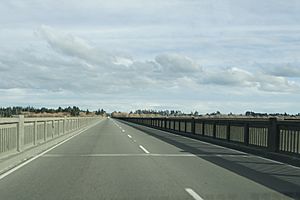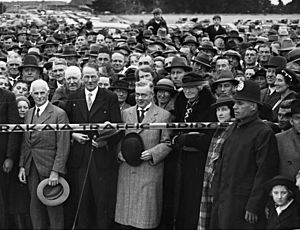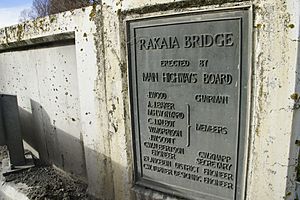Rakaia Bridge facts for kids
Quick facts for kids Rakaia Bridge |
|
|---|---|

Rakaia Bridge (State Highway 1) is New Zealand's longest road bridge
|
|
| Coordinates | 43°44′38″S 172°02′16″E / 43.7440°S 172.0378°E |
| Carries | road traffic |
| Crosses | Rakaia River |
| Locale | Canterbury |
| Other name(s) | Rakaia Road Bridge |
| Named for | Maori name of the river |
| Owner | NZ Transport Agency |
| Characteristics | |
| Design | simply supported reinforced concrete spans |
| Material | concrete |
| Total length | 5,762 ft (1,756 m) |
| Width | 20.5 ft (6.2 m) |
| Number of spans | 144 |
| History | |
| Designer | Public Works Department |
| Constructed by | Rope Construction |
| Construction begin | March 1937 |
| Inaugurated | 25 March 1939 |
The Rakaia Bridge is New Zealand's longest road bridge. It crosses the Rakaia River, which is one of Canterbury's big braided rivers. A braided river has many small channels that weave in and out, like braids.
The bridge you see today opened in 1939. It replaced an older bridge from 1873 that was used by both cars and trains. The current road bridge is a little bit downstream from where the old rail bridge was. It is an important part of State Highway 1, a main road in New Zealand.
Contents
The First Rakaia Bridge
Planning the Railway
In April 1864, the Canterbury Provincial Council decided to build a railway line. This railway would go from Christchurch all the way to Timaru. They hired an engineer to design a bridge over the Rakaia River. The plan was to start building it right away.
However, there were problems with money. The Rakaia Bridge project did not start as planned. By October 1867, the railway line had reached Selwyn, about 35 kilometers from Christchurch. The local government was very short on funds, so they had to stop construction for a while.
Building the Road Bridge
The provincial government then asked for bids to build a road bridge over the Rakaia River. On October 17, 1869, William White won the contract. He had built another bridge over the Waimakariri River before.
White was supposed to build a timber bridge with 96 sections, each about 12.2 meters long. Much of the wood came from Little River. It was then moved by boat across Lake Forsyth and Lake Ellesmere / Te Waihora.
A Combined Bridge
Work on the road bridge stopped the next year. This was because they decided to make it a combined bridge for both road and rail traffic. William White won the second contract for this new, combined bridge.
An engineer from Christchurch, William Bayley Bray, suggested making the bridge sections shorter. He thought 6.1-meter sections would work. The provincial council agreed to this idea. Another engineer, John Blackett, checked the plans. He suggested using crosswise joists and long planks. However, the builder decided to use crosswise planks directly on the main beams. They added a 127 mm layer of asphalt on top. The provincial engineer agreed to this change.
Opening and Problems
The bridge was finished on April 16, 1873. The handrail was not yet in place. The official opening was on May 29, 1873. William Rolleston, who was in charge of the Canterbury Province, opened the bridge. Many important people were there.
The bridge cost about NZ£36,196. It was about 5.2 meters wide and 1365 meters long. The railway tracks were first laid in a "broad gauge" of 1.6 meters. This was the standard size for railways in Canterbury at that time.
The changes made during construction caused problems. The planks bent under the weight of traffic, and the asphalt broke apart. A special investigation found faults with everyone involved. Most of the blame went to the provincial engineer. The bridge deck had to be rebuilt.
On the new deck, the railway tracks were changed to New Zealand's standard size of 1.067 meters. Just before the rebuilding was finished, a big flood washed away both ends of the bridge. The bridge was then made longer, reaching 1836 meters with 224 sections. This first bridge was used until March 1939. The Railway Department officially owned it.
The Current Rakaia Bridge
A New Road Bridge
In June 1931, the Railway Department said they would charge more to use the Rakaia Bridge. This made the Main Highways Board start looking into building a new road bridge just for cars. They finished their research in March 1933.
Later, talks began for the Main Highways Board to buy the old bridge. They wanted it to become a road-only bridge. At the same time, the Railway Department wanted a new bridge because trains were getting heavier.
Why a New Bridge?
In the end, they decided to build a new road bridge. It would be made of strong concrete and built right next to the old bridge. A new railway bridge would be built a short distance upstream.
One big reason for a new bridge was that the old one was too narrow. It was common for two large vehicles to meet on the bridge. One vehicle would have to back up, which was hard and slow on a bridge about 1.6 kilometers long. Sometimes, traffic would get stuck behind a group of sheep for as long as an hour!
The Main Highways Board first suggested that three nearby areas, Ashburton, and Ellesmere, pay for some of the building cost. But in the end, the new bridge was paid for entirely by the Main Highway Fund. This meant the local areas did not have to pay for its upkeep anymore.
Opening the New Bridge
Construction of the current bridge started in March 1937. It was officially opened on March 25, 1939. Bob Semple, the Minister of Public Works, led the ceremony. Other speakers included H. C. Harley from the Canterbury Automobile Association, who helped organize the event, and Arthur Grigg, the local member of parliament.
The new bridge was designed by the Public Works Department. The main designer was Fritz Langbein. The company that built it was Rope Construction Company. The bridge has 144 sections, each about 12.2 meters long. Its total length is 1756 meters.
The old Rakaia Bridge was last used by a train on December 12, 1939, at 9:56 AM. A mixed train from Ashburton was the first to cross the new railway bridge at 12:30 PM on the same day. The new railway bridge was opened without a ceremony. At 1743 meters, it is New Zealand's longest rail bridge.
Images for kids
 | Misty Copeland |
 | Raven Wilkinson |
 | Debra Austin |
 | Aesha Ash |





